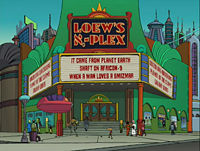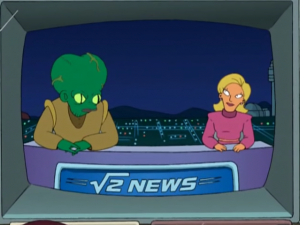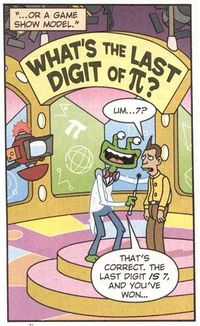List of mathematics references
Jump to navigation
Jump to search
This article attempts to list references to specific and common mathematical issues.
Season 1
"Love's Labours Lost in Space" (1ACV04)
- The Nimbus ship has the serial number "BP-1729", a reference to the Hardy-Ramanujan number, the smallest non-trivial taxicab number.
Season 2
"Xmas Story" (2ACV04)
"The Lesser of Two Evils" (2ACV06)
- Flexo's and Bender's serial numbers, 3370318 and 2716057 respectively, are a sum of two cubes(this is 100% a reference):
- 3370318 = 1193 + 1193
- 2716057 = 9523 + (-951)3
"Put Your Head on My Shoulders" (2ACV07)
- While Fry and Amy are in the closet, there are two books labelled P and NP. This refers to the P versus NP problem in computer science.
- Outside of Bender's computer dating service, the sign advertises that it is "discreet and discrete", referencing the field of discrete mathematics.
"Raging Bender" (2ACV08)
- This episode as well as in "I Dated a Robot", features the theater Loew's ℵ0-Plex. ℵ (aleph) is used in a sequence of numbers to represent the size of infinite sets. Also, the suffix -plex means how many screens in a cinema. In this case, the ℵ would indicate that there is a countably infinite number of screens in Loew's theater. (it represents the cardinality, not the size).
"The Problem with Popplers" (2ACV15)
- On the billboard that Leela again crashes, it shows how much Popplers were sold. It says: 3.8 x 1010 popplers sold. That number is the average distance from the Earth to the Moon (measured in centimetres).
"The Honking" (2ACV18)
- Bender sees the number 1010011010 in the mirror. After the binary digits have been decoded, it reads "666".
Season 3
"Parasites Lost" (3ACV02)
- In this episode, a sign reads Historic √66 (pronounced Historic Root 66, or Route) is a parody of the U.S. Route 66. It is also an irrational root.
"Insane in the Mainframe" (3ACV11)
- The π-in-1 oil is an oil lubricant, with an irrational amount of oils in one.
"Future Stock" (3ACV21)
- πth Avenue is an irrational avenue, one of the many irrational references by the Futurama writers!
Season 4
"Less than Hero" (4ACV04)
- πkea is yet another irrational number reference.
Season 5
Bender's Big Score
- In Bender's Big Score, Al Gore drives a cab that has the number 87,539,319 on it. This is the third taxicab number.
- Sweet Clyde demonstrates some razzle-dazzle Globetrotter calculus using variation of parameters and expanding the Wronskian, both techniques used to solve differential equations.
The Beast with a Billion Backs
- In The Beast with a Billion Backs, Colleen can be seen wearing a shirt with a quantified statement at the church where Yivo is introduced. The statement reads "For all X, I Love (heart) X."
Bender's Game
- In the beginning of Bender's Game, the Planet Express ship goes through various numbers, that are the digits of e. The number e, as π, is irrational and has infinite digits.
Season 6
"Rebirth" (6ACV01)
- Bender visits Studio 1²2¹3³, equal to 54, which is a reference to Studio 54 in New York.
"Lrrreconcilable Ndndifferences" (6ACV11)
- The ⁴√4 in Channel ⁴√4 is an irrational number, equal to √2.
"Benderama" (6ACV17)
- Prof. Farnsworth invents a copy machine that makes 2 exact duplicates of any object. The model on the copier (that looks like an old overhead projector) says Banach-Tarski. From Wikipedia The Banach–Tarski paradox is a theorem in set-theoretic geometry, which states the following: Given a solid ball in 3‑dimensional space, there exists a decomposition of the ball into a finite number of disjoint subsets, which can then be put back together in a different way to yield two identical copies of the original ball."
Recurring
"Channel √2 News"
- While talking of irrational numbers, the √2 in Channel √2 News an irrational number itself, which means (possibly) that there are root signs on remote controls, and more irrational channels out there.
"7¹¹"
- 7¹¹, equal to 1,977,326,743, is a convenience store open 28 hours a day (possibly 7:00 AM until 11:00 AM of the following day. Or, time has been recalibrated in the future).
Comics
"The Bender You Say"
- There is a game show asking "What's the last digit of π?", and the man answers 7. But π is an irrational number, which means it doesn't end. He would be right if the statement "If there is a last digit of π, then it is 7" were true, and wrong if the statement "There is a last digit of π, and it is not 7" were true. In logic, the statement "if p then q" is vacuously true if p is false.
| Science-related lists | |
|---|---|
| List of science goofs • List of computer science references • List of physics references • List of mathematics references | |
This article or section is a stub. You can help by expanding it.


